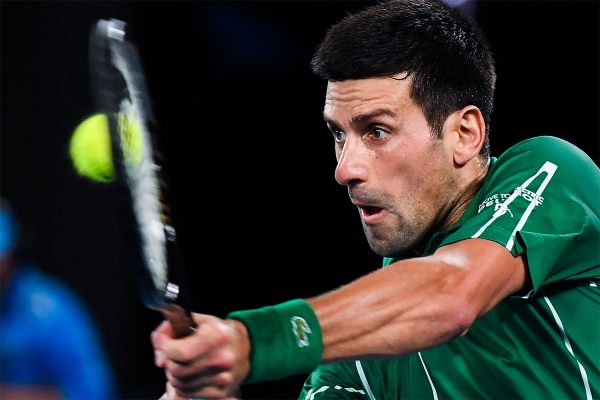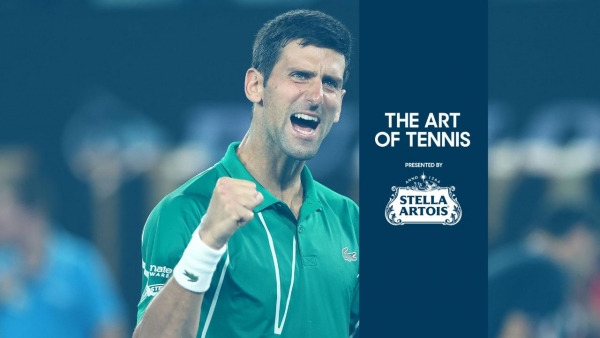There is a familiarity to Novak Djokovic’s time in Melbourne each year, from his regular visits to his favourite fig tree at the Botanical Gardens to his frequent trips to the Australian Open final.
In his 16 appearances at Melbourne Park, Djokovic has reached the decider on eight occasions, and he’ll be going for a record-extending eighth Australian Open crown when he takes on Dominic Thiem in the championship match on Sunday.
MORE: Novak flicks Federer aside to make decider
One figure experiencing Djokovic’s magical connection with Melbourne up close for the first time is his co-coach Goran Ivanisevic, who was added to the Serb’s camp midway through 2019, right before Wimbledon.
The Croatian, who previously coached Marin Cilic, Milos Raonic and Tomas Berdych, has known Djokovic since he was a young teenager, and was thrilled to get the call last year, inviting him to share coaching duties with Marian Vajda.
“It doesn’t get better than this. When the No.1 calls you, I compare it to football, Real Madrid calls you, like he calls you,” Ivanisevic told wimbledon.com at the All England Club last July.
“For me it’s kind of a reward, it means I did something well in the past.”

The 2001 Wimbledon champion is in awe of Djokovic, his ambition and his constant need for improvement.
On Sunday, the 32-year-old Belgrade native will be seeking a 17th Grand Slam singles title that would put him just three shy of Roger Federer’s men’s all-time record, and two behind Rafael Nadal’s tally. The three-way battle for supremacy between Djokovic, Federer and Nadal is one of the most compelling in all of sport, and it’s one Ivanisevic never would have predicted when he met a 14-year-old Djokovic at Niki Pilic’s academy in Munich nearly two decades ago.
“I was practicing at Niki Pilic’s academy, he was my coach and Novak was there. And Pilic told me, ‘Here is one kid, 14 and a half years old who is going to be the best tennis player in the world in the future’. So I said, ‘Okay, let’s hit’,” Ivanisevic told Jon Wertheim on the Beyond the Baseline podcast this week.
“He’s from Serbia, this small skinny kid comes. We played tennis, and a couple of years after, this young little kid is one of the best tennis players in the world, and who knows, maybe the best ever in the history of tennis.”
Does Ivanisevic consider Djokovic to have the edge in the GOAT (greatest of all time) debate?
“For the past nine years he is, by statistics, by winning Grand Slams, by every… by winning matches, he is by far number one,” said the 48-year-old Hall of Famer.
“What’s going to happen when all three finish their careers? We’ll see. But it’s always you know, maybe you like more Federer, maybe you like more Nadal, and everybody likes different styles. But they didn’t say bye-bye yet, they’re still going to have a couple of years of playing and a lot of things are going to change, a lot of records are going to be broken and hopefully Novak can do that.”
Djokovic is 12-0 so far this season, having gone undefeated at the ATP Cup, which he won with Serbia, before his run to the final here in Melbourne. The world No.2 has already posted four top-10 wins in 2020 and could replace Nadal at the top of the rankings should he defeat Thiem on Sunday.
“I'm pleased with the way I've been feeling and playing. I thought ATP Cup went really well for me, got a lot of hours spent on the court, singles and doubles. It was a great lead-up for Australian Open. Obviously got a lot of positive energy from that competition. I dropped only one set so far up to the finals,” said Djokovic, who lost a set in his opener to Jan-Lennard Struff last week.
Team Djokovic is all about positive energy. Vajda and Ivanisevic have known each other for 30 years, and even competed against each other as players. They all share a sense of humour, and have a strong Balkan connection.
“As a kid Novak was different, different thinking, the way his life developed, the way he is on the court, the way he is off the court. Also he is a national hero in his country and we [Serbia and Croatia] had problems before and he took me as a coach [anyway],” Ivanisevic said on the podcast.
“His way of thinking is completely free of that. I was always a huge supporter of him before I became his coach. I was kind of a little surprised when I received this phone call last year to join the team. We always had a good relation and we were friends, but still you know – not because I’m a bad coach, but he was No.1 so I didn’t know why he wants to add some more people in the team.”
Ivanisevic later realised just how much Djokovic still wants to improve, and those watching the Serb closely can already notice the tweaks his coach made to his serve. Djokovic has won 82 per cent of his first-serve points this fortnight and was broken just seven times through six matches. The 70 aces he hit so far this tournament place him joint-sixth on the stats leaderboard for the entire men’s draw.
But beyond the impressive serve stats, which a big-server like Ivanisevic is undoubtedly proud of, it is their shared grit and mental toughness the Croatian values so much.
“People generally when you say, ‘Oh, he’s Balkan’, they kind of look at you differently. It doesn’t matter if you’re Serbian or Croatian, it happens. I got that a lot of times. And I’m like, ‘What? We’re not good enough?’ Kind of look at the success of people from there, it’s much higher because in our minds we have to show them all the time that we are better, or at least like them,” explains Ivanisevic.
Djokovic is pleased with how well both his coaches complement each other, and gave some insight this week into the mind of his mentor.
“Goran, his philosophy has always been less is more, kind of giving the right information to the player, then understanding how a player can actually benefit from that,” said the seven-time Australian Open champion.
“He likes to simplify things. It's working well.”
